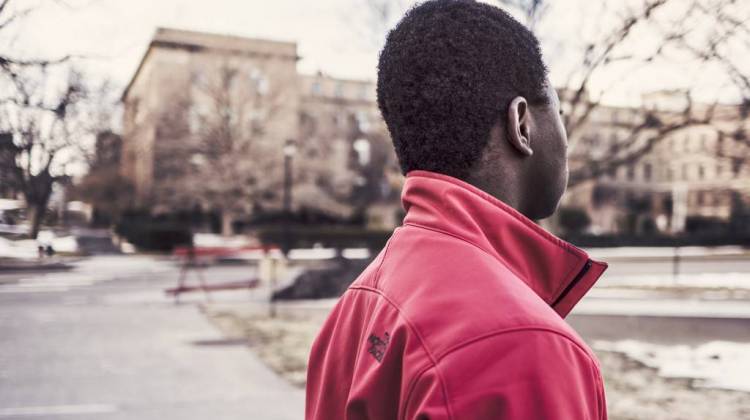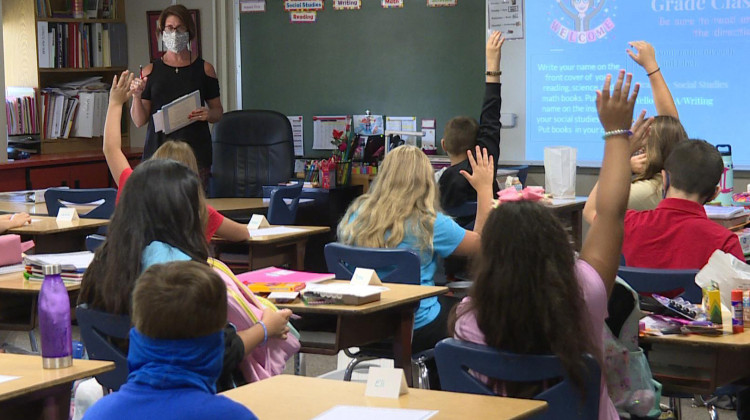
A new study found that black students who have just one black teacher in elementary school are significantly more likely to graduate high school.
Creative Commons/PexelsThere’s a new study out and it finds black students who have just one black teacher in elementary school are less likely to drop out and are significantly more likely to graduate high school.
The study’s major takeaways:
- Low-income black students who have one black teacher in third, fourth or fifth grade are 19 percent more likely to graduate and want to attend a four-year college.
- For males from persistently low-income families, the result is even larger: Having a black teacher makes it 29 percent more likely they pursue a four-year college degree after graduation.
- The report also suggests that exposure to just one black teacher in third, fourth or fifth grade makes it 39 percent less likely that a male student from a low-income family will drop out of high school. The presence of a black teacher does not have the same effect on female students, according to the report.
While there have been a growing number of studies that examine how race, bias and education intersect, this one is different.
The report sheds light on new, long-term effects.
In this study, researchers examined records of about 100,000 North Carolina students from elementary school to high school. They examine students’ teacher demographics and compare it to student achievement later on. After finding that the mere presence of a black teacher had significant impacts on a student’s life, the researchers wanted to be sure it wasn’t a fluke. They performed a similar study on student data from Tennessee. And got the same results.
Although the study highlights one black teacher’s meaningful effect on students’ outcomes, the researchers find that the effects are not notably multiplied with additional black teachers. Instead, one seems to be all it takes.
Researcher Constance Lindsay, a lecturer at American University and a study author, has studied everything from how race effects discipline to single-sex education outcomes. Here, we speak about this latest study.
On the data used:
“The state collects all of this administrative data. It’s very useful for researchers because there’s lots of different things you can do. In elementary school, for example, you can find out who their teacher was based on tests they took at the end of the year. Then there’s information on the teacher’s personnel file so you can look up demographic information from the teacher. Then you can follow-up with a student years later to see what their outcomes were: Did they drop out? Did they signal that they were going to attend college?”
On realizing that black teachers led to better outcomes for black students:
“We had been working on this probably off and on for at least six months. We got our first round of results and we said, 'Wow, it really looks like there’s a relationship here.' We ended up finding the largest result for persistently poor black boys — and indeed, most of our results are driven by the black boys.”
On whether more than one black teacher boosts effects:
“We tried to look and see does it matter if you just have one black teacher? Or maybe there’s some advantage to having two or three during that early period? Didn’t find anything there. And we didn’t find anything about the sequencing of your black teachers. So it’s literally just having at least one black teacher in those grades that leads to these particular outcomes.”
On why these outcomes occur:
“We can speculate on some mechanisms …black teachers might have higher expectations on black students. Another thing that we thought about was the role model effect. That having a black teacher that can be a role model for you might change your outcomes. Our other work shows that there’s less discipline [with teachers of the same race]. So, obviously, if you don’t get in the school-to-prison pipeline things will probably be better for you. We can’t necessarily speak to the 'why' so much just right from this particular data set and study, but there’s a few mechanisms that we’ve been speculating on that we might look at in future research.”
On gender of the teacher:
“We don’t look at gender of the teacher, but that’s perhaps something we can do later. In our other work in North Carolina we did find that gender did make a difference in discipline. In that case, black women teachers [suspended and expelled less] for all students – white students, non-white students and black students.”
On hopes for the future:
“There’s a really large conversation, in general, on teacher diversity. We have a teacher diversity problem because there are [racial] achievement gaps in K-12 education. So you don’t have the pool of [black] people going into college, so there’s sort of a supply issue that needs to be taken care of in terms of getting a more diverse teaching workforce. On the flip side, this work is really exciting because it’s saying 'at least one black teacher in elementary school.' So you can think about if you’re at the district level, maybe there’s a way you can rearrange or reassign teachers to coverage across the district. There are some practical policy implications and it also contributes to this larger conversation.”
 DONATE
DONATE






 View More Programs
View More Programs



 Support WFYI. We can't do it without you.
Support WFYI. We can't do it without you.